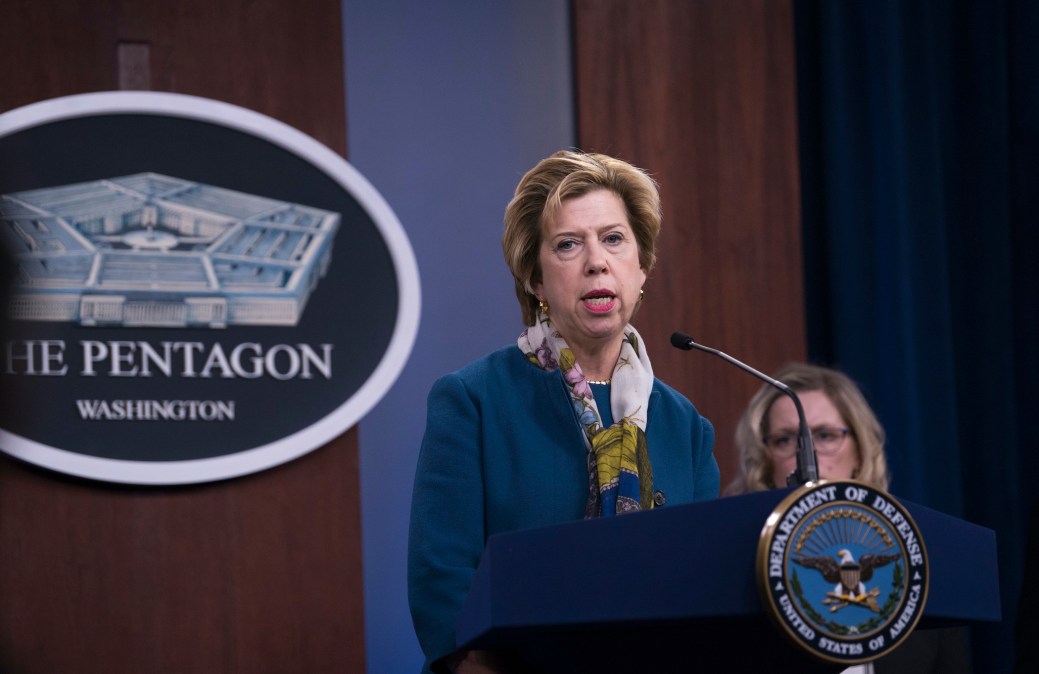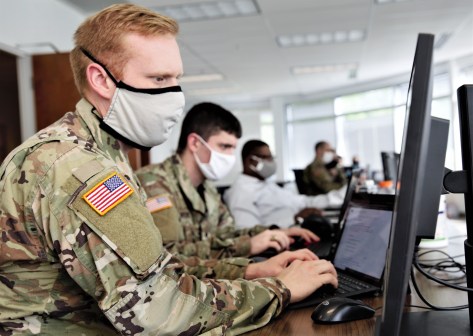DOD warns contractors of taking ‘adversarial’ investments during pandemic

Defense contractors might be feeling the urge to seek capital to stay afloat during the coronavirus pandemic, especially for the parts of their business that don’t rely on federal dollars. But those companies should stay away from foreign investors who may be “adversarial” to U.S. national security, top Department of Defense officials said this week.
“It’s critically important that we understand that during this crisis the [Defense Industrial Base] is vulnerable to adversarial capital, so we need to ensure companies can stay in business without losing their technology,” Ellen Lord, undersecretary of defense for acquisition and sustainment, told reporters Wednesday. She said foreign sources, whether used for capital investment or production of contracted goods and services, have an associated “fragility.”
The coronavirus pandemic and economic downturn “presents a greater attack surface” for malicious foreign actors “as there is uncertainty especially with small businesses as to whether their contracts will continue,” Lord said. “So we want to basically mitigate that uncertainty.”
Since last summer, the DOD has been hosting events around its Trusted Capital Marketplace, “a public-private partnership that will convene trusted sources of private capital with innovative companies critical to defense industrial base and national security.” The department has continued to host the events virtually as the COVID-19 pandemic has limited in-person interactions across the Pentagon.
Jennifer Santos, deputy assistant secretary of defense for industrial policy, said the Trusted Capital Marketplace program is targeted at getting “to the left” of the Committee on Foreign Investment in the United States (CFIUS) review process, which is meant to protect national security in any foreign transactions. Doing so, Santos said, ensures “that critical companies are able to access clean capital that assists their commercialization.”
Still, the DOD will look to strengthen reviews under CFIUS during this critical time, Santos said, calling it “more important than ever.”
“We simply cannot afford to let this period of uncertainty eat into reviews that foreign investment is shifting into hypervigilance,” Santos said.
Lord added: “There is no question that we have adversarial capital coming into our markets for nefarious means. So what we are doing is on the defense side looking at CFIUS, on the offensive side we’re using our trusted capital mechanisms.”
The DOD has also created a Joint Acquisition Task Force to synchronize the department’s response to the coronavirus as it relates to the acquisition community. That task force is led by Stacy Cummings, principal deputy assistant secretary of defense acquisition enablers in the DOD.
In addition to directing “Defense Production Act authorities and funding in response to this immediate crisis,” Lord said, the task force will work on “building capacity in identified areas of fragility in the defense industrial base, both the industrial capability and workforce, with a focus on reducing reliance on foreign supply sources.”
Supply chain heat map
DOD has data repositories and portals and is establishing new ones within its Defense Contract Management Agency and the joint task force to ” bring in critical feedback” and accept “good ideas from industry so that there is one repository where we can go and see what is being offered in terms of technical assistance and manufacturing capabilities,” Lord said.
For instance, the department has developed a heat map that overlays coronavirus positive tests with shelter-in-place restrictions across the country to “help us with predictive solutions and planning when overlaid with the location of our industry partners,” Lord explained.
Santos said that tool, which she referred to as a supply chain heat map, helps DOD leadership “understand the impacts of the supply chain overlaid with the [Centers for Disease Control and Prevention] data.”
Lord issued guidance last week declaring the defense industrial base an essential critical infrastructure that should continue operation during the pandemic. She said this was necessary because “industrial leaders told us that state and local governments had different shelter-in-place rules and guidelines, with some even issuing misdemeanor citations to workers trying to get to work.”
“I will tell you, the vast majority are working,” Lord said of defense contractors. “They do want to work. CEOs are reaching out to us to ensure that they can continue operations.”
In the end, the DOD officials did not have clear answers to many of the most pressing questions, such as what specifically defense contractors are being asked to do under the Defense Production Act to support. Lord said the department recognizes “what we’re doing is imperfect” but is moving as quickly and thoughtfully as possible during the current crisis to respond in the best interest of national security.
“I want to emphasize that we are looking at the totality of what we do with the acquisition workforce — supporting the warfighter, making sure that both readiness and modernization are underway, all the way back to making sure that we have a secure, safe, and resilient defense industrial base — so, close communication, keeping cash flowing, keeping operations going with minor pauses in a variety of places,” she said.






